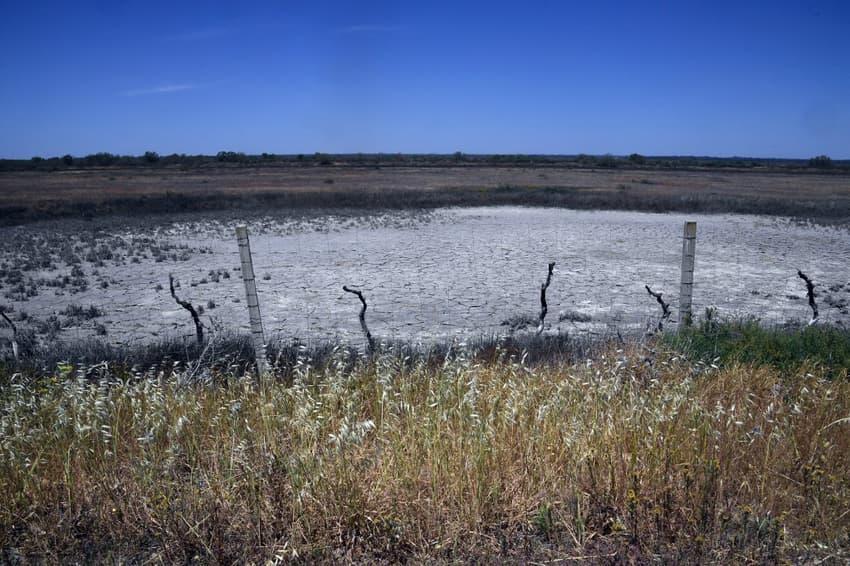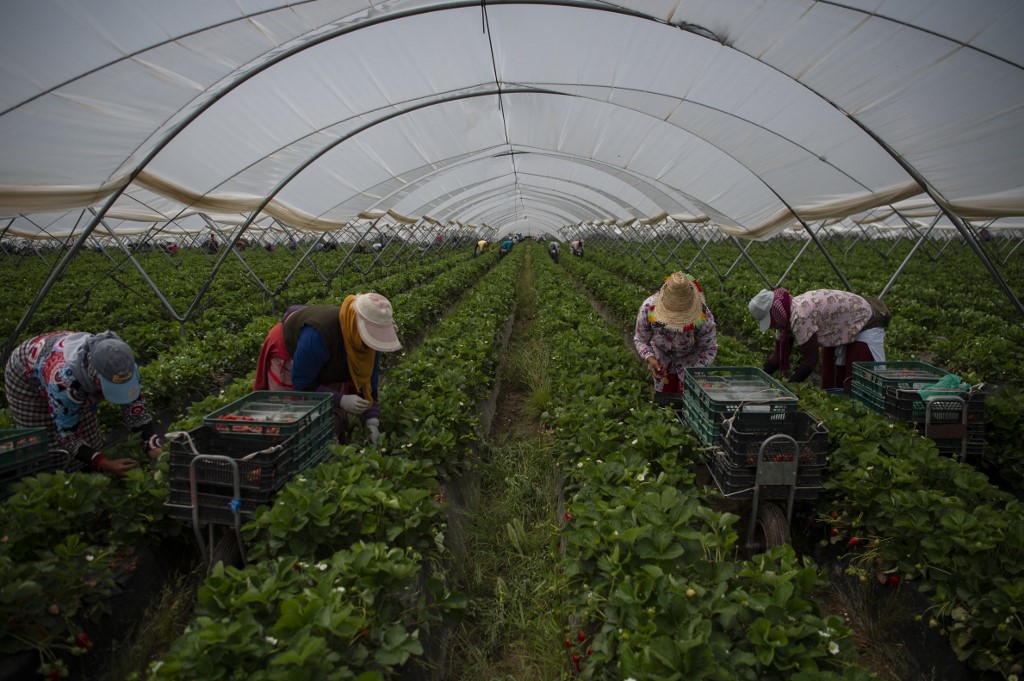Water woes shake up Spain's election campaign

Concern over the future of Spain's Doñana natural park, which is threatened by over farming, has made
water management a key issue ahead of local elections at the end of May.
Spain's water resources are becoming exhausted while its irrigation needs keep rising, "an unsustainable situation", said Felipe Fuentelsaz of WWF Spain.
The Doñana National Park in the southern Andalusia region, home to one of Europe's largest wetlands, is in a "critical state", he added. "For the past two years, it has barely rained. But farmers continue to draw enormous quantities of water from the groundwater table."
With its mix of dunes, forests and lagoons, the park once hosted huge colonies of migrating birds. Now it is mostly dry, and storks and flamingos are a rare sight.
READ ALSO: Spain to spend €2 billion to tackle drought
A recent study by the Spanish National Research Council (CSIC) found 59 percent of the park's largest lagoons have dried up. And the situation could get worse.
The conservative Popular Party (PP) which governs the region introduced a draft law backed by far-right party Vox that would legalise illegal berry farms near the park.
The WWF estimates some 1,500 hectares (3,700 acres) of farmland which are currently irrigated using water from illegal wells would be legalised by the move.
Defenders of the proposal argue it will help farmers who missed out during a previous regularisation of farms in the area in 2014 under a Socialist government.
The plan will "put an end to an injustice", said Manuel Andrés González, a lawmaker with the PP from the southern province of Huelva where the park is located. He argues "hundreds" of farmers were unfairly left out of the previous regularisation.

Strawberry pickers are at work in a greenhouse, in Ayamonte, near Doñana National Park. Photo: JORGE GUERRERO / AFP
'Selling a dream'
These arguments are rejected by the left-wing mayor of the town of Almonte located inside the park, Rocío del Mar Castellano, who called the proposed plan "dangerous".
"There is no more water. How can they propose increasing the amount of irrigated land? The PP is selling a dream to win votes," she added.
READ ALSO: The food products in Spain that will rise in price due to drought
The debate has made headlines in the run-up to the regional and local elections on May 28th, and a year-end general election.
Both Socialist Prime Minister Pedro Sánchez and the national leader of the PP, Alberto Núñez Feijóo, have visited Doñana in recent weeks.
"Donana will not be touched," said Sánchez last month, accusing the right of "climate denial".
Feijóo responded by saying Doñana "does not belong to Sánchez". He accuses the premier of fuelling a controversy over the plan to distract attention from his government's failure to adequately manage water resources.
If the right wins the next general election, Feijóo has said: "We will get water to places that don't have any."
Pablo Simon, a politics professor at the Carlos III University in Madrid, said Sánchez's focus on the climate issue allows him "to reposition himself on an axis that suits him - a left-right axis in which he has more to gain than to lose".
'Playing with fire'
The debate has thrown the spotlight on how drought-prone Spain uses its fresh water. The country is the European Union's biggest producer of fruit and vegetables and 80 percent of its fresh water is used by farmers.
"We can't continue to be Europe's vegetable garden. It's irresponsible," said Julia Martínez, an expert with the New Water Culture Foundation, a non-profit organisation aimed at promoting more sustainable water management.
The group calls for a "drastic change in policy", with a sharp reduction in the amount of irrigated land in Spain.
Sánchez's government announced last week it planned to spend €1.4 billion to build new infrastructure such as desalination plants to boost freshwater supplies.
Huelva province accounts for 90 percent of Spain's strawberry output.
Castellano, the mayor of Almonte, said that while strawberry farming was important, "we can't play with fire". "If the water disappears, we won't have any more strawberries at all," she added.
Comments
See Also
Spain's water resources are becoming exhausted while its irrigation needs keep rising, "an unsustainable situation", said Felipe Fuentelsaz of WWF Spain.
The Doñana National Park in the southern Andalusia region, home to one of Europe's largest wetlands, is in a "critical state", he added. "For the past two years, it has barely rained. But farmers continue to draw enormous quantities of water from the groundwater table."
With its mix of dunes, forests and lagoons, the park once hosted huge colonies of migrating birds. Now it is mostly dry, and storks and flamingos are a rare sight.
READ ALSO: Spain to spend €2 billion to tackle drought
A recent study by the Spanish National Research Council (CSIC) found 59 percent of the park's largest lagoons have dried up. And the situation could get worse.
The conservative Popular Party (PP) which governs the region introduced a draft law backed by far-right party Vox that would legalise illegal berry farms near the park.
The WWF estimates some 1,500 hectares (3,700 acres) of farmland which are currently irrigated using water from illegal wells would be legalised by the move.
Defenders of the proposal argue it will help farmers who missed out during a previous regularisation of farms in the area in 2014 under a Socialist government.
The plan will "put an end to an injustice", said Manuel Andrés González, a lawmaker with the PP from the southern province of Huelva where the park is located. He argues "hundreds" of farmers were unfairly left out of the previous regularisation.

'Selling a dream'
These arguments are rejected by the left-wing mayor of the town of Almonte located inside the park, Rocío del Mar Castellano, who called the proposed plan "dangerous".
"There is no more water. How can they propose increasing the amount of irrigated land? The PP is selling a dream to win votes," she added.
READ ALSO: The food products in Spain that will rise in price due to drought
The debate has made headlines in the run-up to the regional and local elections on May 28th, and a year-end general election.
Both Socialist Prime Minister Pedro Sánchez and the national leader of the PP, Alberto Núñez Feijóo, have visited Doñana in recent weeks.
"Donana will not be touched," said Sánchez last month, accusing the right of "climate denial".
Feijóo responded by saying Doñana "does not belong to Sánchez". He accuses the premier of fuelling a controversy over the plan to distract attention from his government's failure to adequately manage water resources.
If the right wins the next general election, Feijóo has said: "We will get water to places that don't have any."
Pablo Simon, a politics professor at the Carlos III University in Madrid, said Sánchez's focus on the climate issue allows him "to reposition himself on an axis that suits him - a left-right axis in which he has more to gain than to lose".
'Playing with fire'
The debate has thrown the spotlight on how drought-prone Spain uses its fresh water. The country is the European Union's biggest producer of fruit and vegetables and 80 percent of its fresh water is used by farmers.
"We can't continue to be Europe's vegetable garden. It's irresponsible," said Julia Martínez, an expert with the New Water Culture Foundation, a non-profit organisation aimed at promoting more sustainable water management.
The group calls for a "drastic change in policy", with a sharp reduction in the amount of irrigated land in Spain.
Sánchez's government announced last week it planned to spend €1.4 billion to build new infrastructure such as desalination plants to boost freshwater supplies.
Huelva province accounts for 90 percent of Spain's strawberry output.
Castellano, the mayor of Almonte, said that while strawberry farming was important, "we can't play with fire". "If the water disappears, we won't have any more strawberries at all," she added.
Join the conversation in our comments section below. Share your own views and experience and if you have a question or suggestion for our journalists then email us at [email protected].
Please keep comments civil, constructive and on topic – and make sure to read our terms of use before getting involved.
Please log in here to leave a comment.